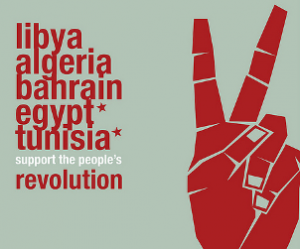Since the end of 2010, an incredible hope has risen from Middle East. The first people to fight was the Egyptians, then the revolution spread to all its neighbours: Tunisia, Libya, Syria or Bahreïn.
Many demonstrations have met violent responses from authorities,as well as from pro-government militias and counter-demonstrators.
How has it ended today? Egypt, Tunisia and Libya have overthrown their leaders: Hosni Moubarak is currently under the threat of a law suit although he’s being very ill, Zine Dine ben Ali fled to Saudi Arabia (which is today the least democratic state in Middle East according to the Democracy Index published by the Economist, and we all know what happened to Muammar Gaddafi a few days ago (Warning: this article contains graphic images).
Now the question is: what comes after tyranny ?
Democracy is another matter, and needs a long labour in building a sense of citizenship, developing tolerance and respect for law that will be hard to understand for a people who lived so long under a dictatorship. It is quite ironic that dictatorship gives bad habits to its victims that can survive the death of the tyrant and complicate the arrival of a democratic state. The circumstances of Gaddafi’s death remind us of the terrible scenes of epuration in 1944, with France’s liberation.
The adoption of Charia (the islamic law) by the temporary government in Libya is a fact that seems to scare the Occidental chancelleries. No doubt that the first decisions of the new government in Libya will be observed closely by the international community: these decisions may define a new standard of the occidental response to the next revolution in the Middle East.
